The Most Excellent Way
Pastor Michael Blog 25 Jan 2025 Michael Falzarano

THE MORE EXCELLENT WAY
"But earnestly desire the best gifts. And yet I show you a more excellent way" (1 Cor. 12:31).
What are the best spiritual gifts? They are the ones that best serve and edify the body of Christ. Indeed, God gives gifts to build up his church, not to inflate personal egos. Yet, some in the Corinth church used their gifts in a self-serving way. Therefore, in chapter 13, Paul directs them toward a "more excellent way." The way of love.
Love sees through a lens of equality and care. However, the Corinthians considered some gifts superior to others, particularly tongues (languages). Such an attitude promoted pride in those who possessed that gift and inferiority in those who didn't.
What was the root problem? The members weren't serving each other out of love. As the apostle declares, one may have all faith, know all prophecy and mysteries, speak angelically, and give all to those in need. Yet, without love, "It profits me nothing."
Spirituality does not stem from knowledge, virtue, or giftedness. Instead, it arises from God's transformative love within the heart and its ready outflow to others. The Corinthians, therefore, missed the fundamental essence of love. So, Paul spells out attributes of love in 1 Corinthians 13:4-8a, "Love suffers long and is kind...love never fails!"
Divine love is never self-centered, boastful, or proud. Instead, it's an other-centered love that is selfless, sacrificial, forgiving, humble, and long-suffering. Love is the foremost fruit of the Spirit (Galatians 5:22). Therefore, the only way to obtain it is by receiving the Spirit. Through the Spirit, we receive God's heart.
By substituting Jesus' name for the word" love" in 1 Corinthians 13:4-8a, you will find that Jesus suffers long and is kind...Jesus never fails! Spiritual gifts are essential, as they reveal the living Christ working through his people. But God is not prophecy nor tongues. No! He is love (1 John 4:8,16). Therefore, love is the ultimate revealer of him, and love will never fail.
The Greek word translated as "fail" in verse 8 indicates a stopping or ceasing. In other words, love will never end! In 1 Corinthians 13:8-10, Paul is addressing its permanence. Unlike love, the gifts will cease when Christ returns and usher us into his eternal kingdom. Even faith and hope will have accomplished their mission and be needed no more.
Paul spoke, understood, and thought like a child when he was a child. However, he put childish things and attitudes away when he matured. We should expect nothing less. But thinking that I am more spiritual than others because I have more knowledge, a better gift, greater oratory, a higher position, or by causing divisions reveals spiritual immaturity. When Christ returns, he expects to gather a mature bride, not a childish one.
In a wedding, where is the bride's heart and eyes fixed? Is it not on her groom, whom she adores? In contrast, the flower girl's attention is on the cake and festivities, not the groom. What about your focus? If it is on the Lord, use your gifts and "through love, serve one another" (Galatians 5:13). It's the more excellent way.
The Hour Has Come
Pastor Michael Blog 23 Jan 2025 Michael Falzarano

“Father, the hour has come” (John 17:1)
Christ exchanged the divine throne of heaven for a lowly manger on earth, a feeding trough in the insignificant town of Bethlehem. That is, God came to dwell with us!
The Bible tells us that as a child, Jesus "grew and became strong in spirit" and "filled with wisdom." He learned, prepared, and grew into his divine mission. At 12, He came of age to enter the magnificent Jerusalem temple. Within its grandeur was something brazen: an altar of sacrifice whence the slaying of lambs took place daily. What did the twelve-year-old Christ see? Himself, His mission! He was to be the true lamb of God to take "away the sin of the world." (John 1:29). The brazen altar cast the cross’ shadow upon the path Christ would hence travel.
At about 30, he, the Messiah, began proclaiming the kingdom of God (Luke 3:23; 4:43). In his three and a half years of ministry, Christ expounded the Scriptures and their prophecies, healed the sick, repaired the broken-hearted, gave the forsaken hope, forgave the guilt-laden and freed the captives of sin (Luke 4:16-18).
Yet, each step also moved him closer to that horrid cross. Yet, for this purpose, he did come. Until, at last, the prophetic clock struck its hour. Some Greeks came to worship at the Passover feast in Jerusalem. These Gentiles' arrival signaled the time had arrived (John 12:20-23). It portended the spiritual harvest his death would yield.
Soon, Jesus's last meal with his apostles arrived, and they became much troubled. Jesus washed their feet, which challenged their pride. Christ said one would betray him, and another would deny him. Then, the unsettling news that Jesus would leave them (John 13:33).
In the garden of Gethsemane, the Lord agonized in prayer over his fate. Meanwhile, His disciples slept, unprepared for the dramatic event unfolding. Judas came from the darkness with a detachment of troops and officers to arrest Jesus (John 18:3), although he was, without sin, entirely innocent. Still, they treated Christ as a vile criminal! The soldiers beat and mocked Him, crowning Him with thorns. The crowd’s fervor cry of "Crucify him, crucify him" rang loud. And so, the deed was done.
Jesus was nailed to the cursed cross in which He bore our sin, guilt, and condemnation. Why? That we need not. The Messiah experienced the pains of the second death, feeling forsaken by God, but was He? Was not the Father in the darkness that enveloped the cross? In faith and peace, he declared, “It is finished”. Jesus met his prophetic destiny as he bowed His head and relinquished his last breath. But was it the end? No! Praise God! The angel proclaimed to the two women, who came to anoint the Lord’s body on the third day: "He is not here; for He is risen" (Matt. 28:6).
The prophetic hour is upon us, and Christ will return to retrieve his children. Fear not, for Jesus is the victor. So will you be if you put your faith in him!
The Shepherd Was a Lamb
Pastor Michael Blog 13 Feb 2024 Michael Falzarano

The Lord is my shepherd; I shall not want (Psalm 23:1, NKJV).
Psalm 23 pictures a sheep amply provided for and well-protected by his faithful shepherd. We, as believers, can be assured that we have such a "good shepherd" who fully provides for our needs and whose presence is ever with us (John 10:11, 14).
As sympathetic as a caring shepherd might be, they can't appreciate what it is to be a sheep. However, Jesus goes far beyond the limitations of an ordinary shepherd. You see, He was firstly a lamb, the lamb of God (John 1:29). As Jesus walked this earth, He, too, needed a shepherd to guide, protect, and provide for him.
Therefore, Psalm 23 is not only about Jesus shepherding His people. More profoundly, it is also about His relationship to His shepherd, His heavenly Father.
What kind of lamb was Christ? A contented lamb we learn from the first verse of Psalm 23. He suffered no lack. The Lamb of God found complete satisfaction in His Father's presence and provisions. The plush green grass and still waters represent this (verse 2). The lamb grazed and now lies in contentment. The still waters amplify the peace brought by His faithful shepherd. The Lamb of God depended entirely on His Father's guardianship and supply. Jesus declared, "I can of Myself do nothing" (John 5:30). Therefore, He was a submissive lamb, dependent on the Father's divine power and care.
We also perceive that Jesus was an obedient lamb. His divine shepherd faithfully led him down paths of righteousness, and Jesus humbly followed. He was a righteous lamb "without blemish or spot" (1 Peter 1:19).
He was even willing to trek the most horrid of all paths, that of "the shadow of death." That is the cross experience, wherein Christ was the paschal lamb, "a lamb led to the slaughter" (Isaiah 53:7). It was the only time in eternity that He felt divine abandonment due to the bearing of the world's sin and its penalty. Even this did not deter Him, for He fully trusted His shepherd would ultimately rescue Him. Because of His unwavering faith, Jesus was the victorious lamb.
We usually picture the faithful sheep celebrating deliverance in verse 5, feasting at a banquet table while its enemies can only watch. But did not God turn the tables on His enemies? Did Christ not die for them (Romans 5:10)? Having done so, He set the feast of salvation before us, prepared by His atoning death. And whence did the Lamb of God go? Although He entered the shadows of the second death experience, He was vindicated and triumphantly rose from death's clutches. He ascended to the house of His Father and anointed with the oil of joy (Hebrews 1:9). The Spirit overflows from Him to empower and comfort us.
Indeed, the sheepdogs of goodness and mercy followed the lamb of God throughout His life, and they do pursue His sheep. Jesus is our faithful shepherd and high priest. Are you following Him in faith as He followed His Father? (1 Peter 2:21,25). If you have drifted from Him, your divine shepherd pleads for your return.
Faithfulness Requires Sacrifice
Pastor Michael Blog 09 Jan 2024 Michael Falzarano
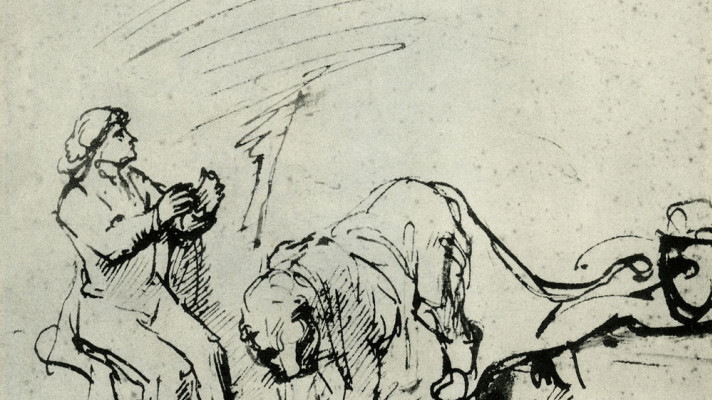
So, Daniel came out of the den alive because he believed in his God. (Daniel 6:23, NKJV)
Does faithfulness involve sacrifice? Sure! We see this in the sixth chapter of Daniel.
Daniel was in his early eighties when the Medo-Persian empire conquered Babylon. Darius became king and set about forming a new government. Daniel showed great integrity, so the king appointed him above all the other officials.
Some praise godliness when encountering it, but others feel threatened by it. That was the case of some leaders subservient to Daniel who feared their lack of integrity would be exposed. Therefore, they used Daniel's devotion to God against him. They ensured the king would decree against petitioning anyone but the king for 30 days.
Regarding the duly established law of men, we should comply unless such law violates God's law. Daniel would have to breach at least the first commandment of the Decalogue to honor the king's decree. But he refuses to shut the windows of his prayer life. Daniel proceeds with his daily intercession of the living God. Such faithfulness brought man's wrath upon him.
It will be so before Jesus' return. Incredible pressure will come upon the followers of Christ to violate God's law to escape economic peril and death. However, true love demands faithfulness, and faithfulness requires a sacrificial heart.
Daniel had such a heart. He laid all on the line to stay faithful to God. It leads him to be amid hungry and ferocious lions. Yet, Daniel has peace! He rests his trust entirely in God, putting his life into His hands.
Once signed, the law of the Medes and Persians was unalterable, even by the king. Therefore, Darius exhausted all options to spare Daniel's life. Or did he? Was there one last thing he could have done to save Daniel? Something radical!
Might the king have taken Daniel's place in the lions' den? Think of that, for it is what our Savior did for us.
Daniel was a type of the Messiah. He was faithful to God and without fault, as Christ was, who also faced a death decree. Similarly, God's law is unchangeable, as was the law of Medo-Persia. It demands the sinner's death if violated. But what King Darius thought not to do, Jesus did. He took our place in the lions' den, sacrificing himself to save us.
Also, note that a vast stone sealed Daniel in the den. There was no human way of escape. But due to his faith and innocence, God raised him from the pit and death's grasp. Wasn't Jesus' tomb sealed with a vast stone as well? Yes, but the grave couldn't hold Him, for He was without any sin. Therefore, He rose alive with power and in triumph.
The faith of Jesus is sacrificial! No matter what, Christ stayed faithful. God's people will exhibit such faith before He returns. Here are those "who keep the commandments of God and the faith of Jesus" (Revelation 14:12).
How about you?
Are you willing to follow Christ, even if it costs you much? After all, faithfulness does require sacrifice.
Do Not Fear, Only Believe
Pastor Michael Blog 08 Jan 2024 Michael Falzarano

"Hearing this, Jesus said to Jairus, 'Don't be afraid; just believe, and she will be healed'" (Luke 8:40, NIV).
I jumped over a low-hanging chain at a park when jogging. Unfortunately, the tip of my foot caught it, and I fell flat on my face into the dirt. A young mother with her small child witnessed my embarrassing mishap. She anxiously asked, "Are you okay? Can I help you?" I slowly looked up to her from the ground and proclaimed, "This was not part of the plan."
Death was not part of the plan! God bestowed eternal life onto Adam and Eve at their creation. Nevertheless, they rebelled against God and fell into the dirt of sin. Sin came through their fall, and "death spread to all men because all sinned" (Romans 5:12). However, death is only a temporary interruption of the plan.
The gospel of Luke addresses the story of a gravely ill twelve-year-old girl (Luke 8:49-55). Her father, Jairus, begged Jesus to come to his home to heal her. The situation was desperate—she was dying!
Jesus heads to the girl with the father but encounters an interruption, that of another precious soul needing healing. The delay must have added to the father's anxiety. By the time he arrived home with Jesus, the daughter had perished.
How helpless Jairus must have felt. We are all helpless against death's grasp. We can try to fight, ignore, or mourn ii, but we have no power to stop it. What brings solace is understanding the plan. Jesus reveals it in just a few words, "Do not be afraid; only believe, and she will be made well." Trust Him, and everything will work out.
The words of Christ are a marked contrast to the loud and hapless wailing coming from the deceased girl's room. Juxtaposed are Jesus' words, filled with hope. Sickness and death will not alter God's plan.
Jesus told them, "Do not weep; she is not dead, but sleeping." However, they ridiculed His words and dismissed the hope He gave. Why? Because they failed to grasp that death is only an interruption.
Notice that Jesus equates it to sleep here and elsewhere. God may let his children of faith sleep the sleep of death, but He promises to wake them from their slumber at the Second Advent of Christ.
After ushering all but the parents out of the room, except for Peter, James, and John, the Lord gently takes the hand of the deceased daughter and says to her, "Little girl, arise." Her breath returned immediately, and she arose upon His command. Gone is the heart-wrenching anguish and loss. Utter joy replaces the grief as the girl is restored alive to her parents.
We may be powerless against death, but God is not. As Christ rose from the tomb, so will His children rise at the end of the age. He guarantees the time will soon come when death and all that comes with it will no longer be (Revelation 21:4).
Therefore, don't be discouraged when things seem to go off script. Instead, trust the Lord that everything will work out. For God will fulfill His plan. "Don't be afraid, only believe."
In The Flesh
Pastor Michael Blog 25 Dec 2023 Michael Falzarano

"And the Word became flesh and dwelt among us, and we beheld His glory" (John 1:14).
Over two thousand years ago, the Messiah was born in an insignificant Judean town; an impure manger became His cradle.
Many think God is far-off and untouchable. After all, can you physically see Him? Can you hear Him audibly speak to you? Can you sit down and have a meal with Him? Can you touch God? Does He have arms to embrace you physically? After all, the Bible says God is Spirit and is invisible (John 4:24; 1 Tim. 1:17). By this, many wrongfully conclude that He is remote and disinterested.
Indeed, due to Adam's sin, a great chasm developed between humanity and God. So, here we are on this tiny planet, just a speck in the cosmos, a leper colony of sinful humanity and activity. At the same time, the holy Creator dwells in the sanctity of Heaven.
But the good news is that "He became flesh and dwelt among us." The Greek word for "dwelt" in John 1:14 means to pitch a tent, that is, to encamp. God, in Christ, pitched His tent with us. Divinity manifested in human skin! God became tangible and near-at-hand.
The Apostles of Jesus knew this experientially. They heard, saw, looked upon, and handled the "Word of life" (1 John 1:1-3). They were with Jesus daily, face-to-face, eating, camping, ministering, and walking with Him—side by side. They saw Him and heard Him speak. They touched Christ, and He embraced them.
John states they both "saw" and "looked upon" Him in 1 John 1:1. These words in Greek are not the same. The word "see" expresses physical sight. But the word used for "looked upon" conveys a deeper sight, that of perception. They saw and came to comprehend what they saw, that God had come in the flesh!
The apostles had close and intimate fellowship with God. That's astonishing! But what of those who came after them? How could they have similar fellowship with God? How could they experience Him in the flesh, as did they? After all, Jesus now dwells in Heaven as our High Priest, interceding on our behalf.
Well, the apostle Paul tells us that the church is the body of Christ. Jesus is the head, His people being His physical body on earth. How can others see, hear, behold, and feel God's touch in human flesh? Through His body—the church! (1 John 1:3) If it functions as God designed, people can have fellowship with Him through it.
But can it happen if Christ doesn't dwell in us? The Lord was born in that unsanitary stable in Bethlehem—a miracle of all miracles. The miracle, as well, is that He wants to be born in us in the unclean stable of our hearts. Through us, Christ is to manifest Himself to the world.
Are you part of His body? Does Christ dwell in you through the Holy Spirit (Romans 8:9; 1 Corinthians 3:16)? Can others find fellowship with God through you and your church? They should! Pray that it is so!
Throwing Stones
Pastor Michael Blog 05 Nov 2023 Michael Falzarano
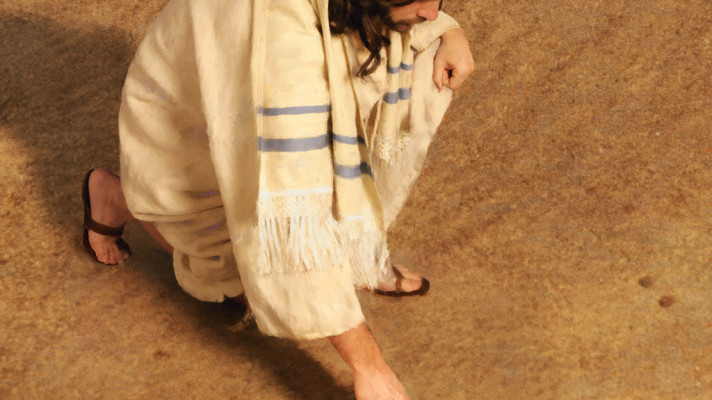
"Now Moses, in the law, commanded us that such should be stoned" (John 8:5).
The nine-year-old Harmon twins crossed a park in 1836. The innocent walk was rudely interrupted by an older classmate's angry taunts. The twins fled their harasser, but as they did, one of them, Ellen, turned to see the bully's location. As she did, the girl hurled a stone, striking her in the face. She fell to the ground unconscious, bloodied, and severely injured. The rock left her disfigured with lifelong health issues. It's a good illustration of why we shouldn't cast stones.
In John 8, there is a story of some religious leaders readied to cast stones at an adulterous woman. They justified this by referencing the law of Moses. The real issue was not the law, as they had violated its precepts. Why was the man who laid with this woman not brought? Where was the due process? There’s no trial, just stones of judgment to execute her.
Their real target was Jesus, who threatened their religious enterprise. These scribes and Pharisees put Jesus in an untenable position. If He agreed to the woman's stoning, He would run afoul of Rome's civil authority. But if Jesus said to stone her, He would run afoul of the law of Moses.
These men's hearts were stony as they carried an agenda of personal destruction. So do those who throw stones in the church. They disguise their agendas with a cloak of righteousness. They cast unfounded aspersions at church leaders or members actively engaged in ministry. Some cast stones to obscure their sins, others to wound and gain influence, and others are spiritual bullies who enjoy knocking others down.
Whatever the agenda, they cause damage to the body of Christ. Like these "religious" men, they care not about the impact of their actions.
Jesus' response to them was brilliant. He got them to look at their sordid history instead of this fallen woman. Perhaps He wrote on the temple dust their sins or the laws they violated. What He wrote brought conviction. Then He instructed the "one without sin to throw the first stone." Jesus revealed the truth of their hearts. In shame, they dropped their stones one by one.
Ellen Harmon had great difficulty breathing through her nose for years. She attended school scarcely and found learning difficult. Something interesting happened to the girl who hit her with the stone. The teacher had her assist Ellen with her school lessons. That meant she had to see her victim's face up close. She witnessed the struggles and pain that her misdeed caused. I imagine she never threw another rock. It's the work of God—to get us to drop our stones.
Instead of casting stones, Jesus cast mercy and forgiveness. In so doing, He didn't violate the law of Moses or usurp Rome's authority. He does tell the woman to discontinue her sinful course, "sin no more." Indeed, her life changed after this striking encounter with Christ. Has yours?
How many rocks have you thrown? God wants us to drop the stones in our hands and empty the pockets of those we carry. Instead of casting stones, let's cast ourselves at the feet of Jesus.
Make Disciples
Pastor Michael Blog 29 Oct 2023 Michael Falzarano
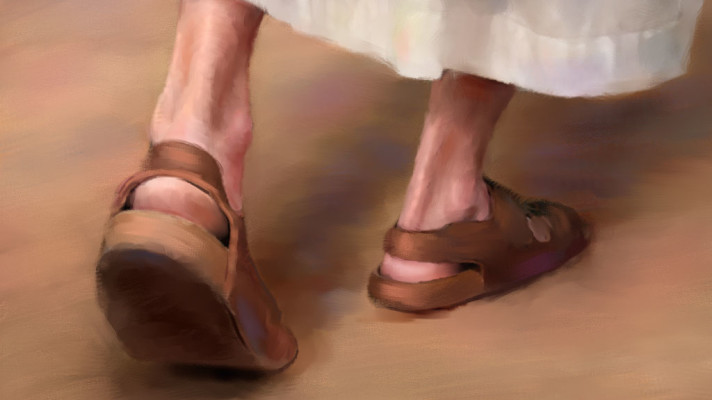
And finding some disciples, he said to them, "Did you receive the Holy Spirit when you believed?" (Acts 19:1-2).
Being a passionate and committed disciple, Paul embraced Jesus' commission to "Go…and make disciples of all nations" (Matt. 28:19). Therefore, when he went to Ephesus, he found some disciples. It was no accident, for he was looking for them.
To make a disciple, we must first find someone we can nurture. Paul found 12 sincere men following the bible's truth that they knew. The apostle then assessed their situation.
Paul asks, "Did you receive the Holy Spirit when you believed?" Their answer said a lot, "We have not so much as heard whether there is a Holy Spirit."
They needed greater understanding and spiritual power. Therefore, Paul asks a follow-up question, "Into what then were you baptized?" He is enquiring about their conversion experience. "Into John's baptism," they replied.
John the Baptist's baptism concerned repentance and turning people to the Messiah. It was vital yet incomplete. Jesus had since died, rose, and ascended into heaven. On Pentecost, God poured out the Spirit to empower the believers for ministry.
After discovering what they lacked, Paul supplied their need. He likely instructed them in biblical faith. Then he re-baptizes them into Christ, His death, burial, and resurrection. Additionally, Paul laid hands upon them. Why? For the baptism of fire, as well as water.
Some have bible knowledge and have been baptized but grow no further. They need the Spirit's empowerment, as did these men.
I understand that! When I longed to achieve more for God, I asked a pastor to lay hands on me for ministry. I was adamant I didn't want to be a pastor but rather to be engaged in lay ministry somehow. A few months after he laid his hands on me, God called me to pastor a church. How did that happen? The Spirit's empowerment. If we are willing to serve, God is ready to plug us into some area of ministry.
The fire is the Holy Spirit, who gave gifts to these Ephesians to do ministry. Paul then shows them how to do ministry. He took them into the synagogues where they could watch him "reason and persuade" others concerning "the things of the kingdom of God." He also modeled how to handle difficult ministerial situations.
Paul was expelled from the synagogues after three months due to the hostility of certain Jews. Yet he persevered and adapted his approach, using a hall conducive to teaching and preaching. These 12 disciples became exposed to Paul's evangelistic methods through these efforts. He would have gotten them involved in the ministry as well. To develop, we cannot be only spectators.
To disciple others, we first tell them! Next, we show them! Then, we involve them! When they have firm footing, we unleash them to do ministry. They, in turn, are to disciple others.
How effective was Paul's method? In just two years, all of Asia Minor heard God's word! Be a disciple of Christ who disciples others. To do so, you need power. Therefore, pray for the baptism of the Spirit.
Follow God, Not The Crowd
Pastor Michael Blog 18 Mar 2023 Michael Falzarano

And all the world marvelled and followed the beast. So, they worshiped the dragon who gave authority to the beast, and they worshiped the beast (Revelation 13:3-14, NKJV).
My wife and I attended a wedding in Los Angeles. Afterwards, we were to drive to a different venue for the reception. GPS didn't exist at the time, and we had no maps. So, we followed a car that left the wedding. We followed it for a reasonable time and distance until it stopped in front of a home in a residential neighbourhood. It was then that we realised we had tailed the wrong car. Follow the wrong vehicle, and you will arrive at the wrong destination!
The world follows the wrong car at the edge of time. A beastly entity will lead the world into false worship. The beast represents apostate Christianity, which will combine with the world's political leaders, much like it did in medieval times. This church and state vehicle will lead the world to venerate the beast and the dragon (Satan)—no wonder the first angel in Revelation 14:7 calls the world to worship God, the creator of all things.
What method does this church-state entity use to gain such veneration? Its uses deceit, fear, and coercion. Such devices are wholly contrary to God, who works through truth, grace, and love. He respects free will and honours liberty of conscience. As His children, so should we.
To worship is to ascribe worth to. God alone is worthy of it. Why? Because He is the "one who made the heaven and earth, the sea, and springs of water" (Revelation 14:7, 4:11). We all owe our lives to Him, "for in Him we live and move and have our being" (Acts 17:28). It would be enough that He created us. But He has also redeemed us from the tyranny of sin through Christ. He has done so at a tremendous cost to Himself. Therefore, to worship a thing or a creature is to deny the greatness of the only true God.
In a momentary lapse, the apostle John bowed in adoration before a majestic angel from heaven. But the angel heartily rebuked him, saying, "Don't worship me…worship only God" (Revelation 19:10, NLT). Yet the world will end up revering Satan, a fallen angel. Talk about arriving at the wrong destination. This car will lead the masses over the proverbial cliff.
Therefore, we must follow God and worship only Him. But we must not wait to do so. We need to come to know God's word and His character now. We should develop the habit of worshipping Him collectively in a congregational setting. But we also need to do so individually and personally. If we genuinely seek Him, we will know He is entirely worthy of our worship. God longs for an intimate relationship with us. Let His word and sacrificial love subdue your heart.
Due to economic pressures, deception, and oppression, the world follows the wrong vehicle before Jesus' return. The beast and his cohorts will lead them to the destination of false worship and peril. How can we avoid such tragedy? By following God, not the crowd.
Living Stones
Pastor Michael Blog 04 Jan 2023 Michael Falzarano
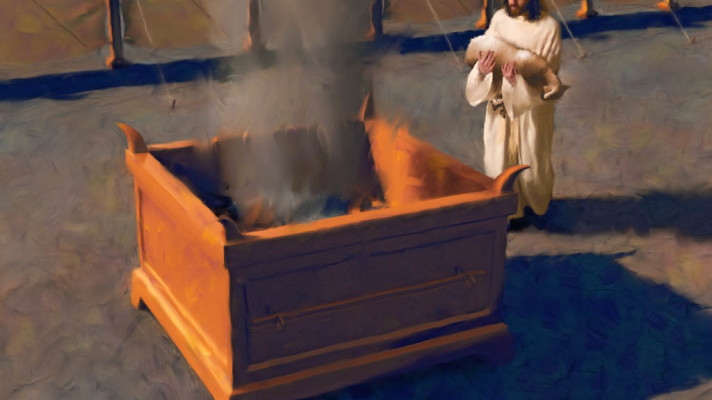
You also, as living stones, are being built up as a spiritual house for a holy priesthood to offer up spiritual sacrifices acceptable to God through Jesus Christ (1 Peter 2:5).
First, God had Israel make a sanctuary in the wilderness. Later it was replaced by a fixed structure in Jerusalem, although Babylon eventually destroyed it. After the exile, Israel built a second temple, which King Herod significantly refurbished centuries later. This one was also destroyed, this time by Rome. Does the Bible speak of another temple on earth? Yes, but different from the previously static ones. The final temple is God's church (2 Corinthians 6:16; Ephesians 2:19-22). It is alive, mobile, and growing. No army can destroy it.
It began with God laying the first stone, the cornerstone. Of course, Christ is that indispensable stone, which all other stones are to align (1 Peter 2:4-8). Although He died by crucifixion, Jesus rose from the grave. Therefore, He is “a living stone”, a living Saviour. When we are connected to Him by faith, we become spiritually alive and living stones in His temple. Upon what foundation do we rest? Is it not the prophets and apostles whom the Spirit inspired to write the Scriptures? (Ephesians 2:20). Christ and His word are the only foundation on which the church can stand.
Just so you know, the stones in Solomon's temple were hewed offsite, at a quarry, to avoid any disturbance in Jerusalem (1 Kings 6:7). As living stones, we too are hewed offsite, in this earthen quarry, in the here and now. Michelangelo stated, "Every block of stone has a statue inside it, and it is the sculptor's task to discover it." Through Christ, God can see His image in us. However, to get to it, He must chisel away what is contrary to His character.
What is the purpose of the temple? It is so God can dwell with His people (Exodus 25:8). The divine presence with and in His people makes them His living temple. But not only are those of faith its building material, but His people are also its priesthood. There were restrictions to being part of the priesthood initially. You had to be a Jewish male within a specified age range. But not in God's last temple, for it is a priesthood of all believers. "There is no longer Jew or Gentile, slave or free, male and female. For you are all one in Christ Jesus" (Galatians 3:28).
The priests' primary function was to offer animal sacrifices, pointing to Christ's sacrificial death for our sins. What "spiritual" sacrifices can we offer, then? Ourselves, as living ones! (Romans 12:1). The animals were laid on the brazen altar dead and then consumed by fire. But we must lay ourselves on God's altar continually. Why? Because a living sacrifice can crawl off the altar. Accordingly, we should be consumed by God's love and presence daily to serve Him. To serve God is to serve others.
So, lay yourselves on the altar today and every day after that. Be connected to Christ and His temple by faith. Be not a dead stone but a living one.
The Missing Engine
Pastor Michael Blog 29 Dec 2022 Michael Falzarano
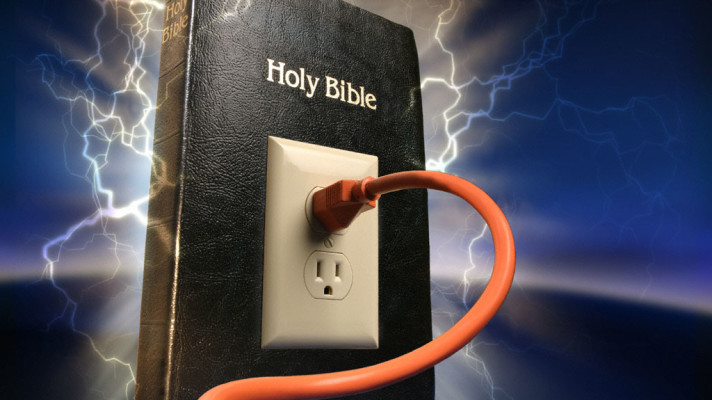
I am not ashamed of the gospel of Christ, for it is the power of God unto salvation for everyone who believes (Romans 1:16).
A news story addressed an American man who got into his car one early morning. He turned the key in the ignition, but nothing happened, only silence. So, the man popped the bonnet to check the motor. To his amazement, someone had stolen his engine during the night.
A car can look fantastic but has no power without an engine. Biblical doctrine is essential, but without its engine, it will lack redemptive muscle. What is the power of God's word? The apostle Paul tells us it's the gospel, which is the "power of God to salvation."
The gospel is "everlasting" (Revelation 14:6). Why? Notice it is not earth-born, for an angel bears it in midheaven. It derives from God and not from man. As God doesn't change, nor does His gospel. He declared it throughout the New Testament as well as the Old Testament. We find it delivered to Adam and Eve in the garden after they sinned. How was it preached? By a sacrificed animal, likely a lamb, whose skin covered the nakedness of their soul (Genesis 3:21). The sacrifice pointed to the Messiah, who would come and bear humanity's sin, guilt, and penalty. The animal's coat pointed to the Messiah's righteous life, exchanged for the sinner's filthy and sinful one. The gospel is truly "good news!"
What is the gospel's power, then? It is that Christ died for our sins, was buried, and then rose from the grave, according to the Scriptures (1 Corinthians 15:1-4). When we accept the righteous life of Christ as our life, His death as our death, and His resurrection as ours, we are justified and given divine power to live for Him. Paul stated that if an angel from heaven, or any other, preached a different gospel, "let him be accursed" (Galatians 1:8). No other gospel has power, for no other one is from God, and therefore no other one can save. Thus, the gospel is not what we can do. Instead, it is what God has already done for us in Christ.
There was a show by some engineering students at the university I attended. The display was of furniture made from cardboard. I was confident that the material was too fragile to bear a sizable weight. But then, a heavy-set man, more than twice my weight, entered the gallery. To my amazement, he sat in one of the cardboard chairs. I expected to hear a thud as the chair collapsed, but it did not! It fully supported him. He placed his faith in the designer and builder of that furniture. He had faith it would securely hold him, and to prove it, he rested his entire weight upon it.
Likewise, if you put your faith in God and rest entirely on what He has done for you in Christ, you will be driven by divine power unto salvation. Therefore, believe the gospel! You can place your whole weight upon it. Otherwise, you may find the engine is missing.
Ropes of Sand
Pastor Michael Blog 12 Oct 2022 Michael Falzarano

Then all the people answered together and said, "All that the Lord has spoken we will do" (Exodus 19:8).
Our wedding vows were not usual. Instead of making promises to each other as bride and groom, we vowed not to make promises. Why? As my bride said in her vows, “I can’t promise you anything…my promises are like ropes of sand”. My wife-to-be went on to declare that she would submit to God daily and trust Him to provide the power to fuel her commitment. I reciprocated similarly. Through God’s grace, we have a fruitful and committed marriage.
At Mount Sinai’s base, the children of Israel made promises to God that they couldn’t fulfil. They had been slaves in Egypt, in bondage to a relentless and tyrannical master, the pharaoh. Therefore, Israel cried out for deliverance, and through miraculous power, God delivered them. Now they stood before Mount Sinai, where Moses spoke the words of God’s covenant to them. They fully agreed, promising to obey everything the Lord said. On the surface, this appeared sincere and reasonable. But was it? One thing for sure is that they failed to achieve what they promised.
Moses ascended the mountain to obtain the Ten Commandments from the Lord. Soon after, the people violated the first two commandments by worshipping the golden calf, proving their promises were nothing more than “ropes of sand.” Indeed, we don’t have the innate power to keep God’s law. The law convicts us of that fact, “for by the law is the knowledge of sin” (Romans 3:20). Did God then cast aside His law? No way! The law is holy, just, and good (Romans 7:12). It is not the problem; we are!
Sin is a force that prevents us from doing what is right. We are slaves to it! What we need, then, is a new master, one who has power over what enslaves us. Of course, God is the only one who is all-powerful. He promises to deliver us and write His law in our hearts and minds (Hebrews 8:10). He can do what we can’t. Therefore, we are to put our faith in Him. Can He not raise the dead? Then surely, He can raise us above sin’s gravitational pull.
How does God inscribe the law in our minds and hearts? As He wrote it on stone, with His finger (Exodus 31:18). Religious leaders accused Jesus of casting out demons using the devil’s sway. Instead, Jesus points them to God’s power working through Him, calling it “the finger of God” (Luke 11:20). What Jesus refers to becomes evident when we cross-reference the story in Matthew 12:28. The “finger of God” is equated to the “Spirit of God”. As love is the law’s essence (Luke 10:25-28), the Holy Spirit uses love’s stylus to write it into our very being (Romans 5:5). Obedience then flows out our love for Christ (John 14:15; 1 John 5:3).
Therefore, instead of promising God to do what you can’t, allow Him to fulfill His promises in you. How? By faith! By submitting your will to His.
The Ministry of Reconciliation
Pastor Michael Blog 18 Sep 2022 Michael Falzarano
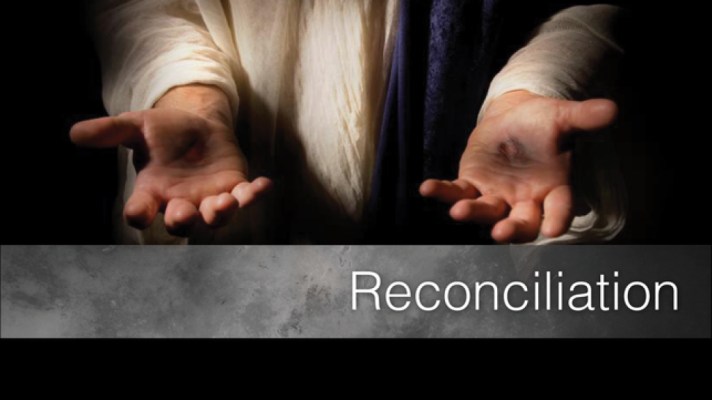
God was in Christ, reconciling the world to himself, no longer counting people's sins against them. And he gave us this wonderful message of reconciliation. (2 Corinthians 5:19, NLT)
An elderly couple rode in the front seat of their car at a time when bench seats were standard. As usual, the aged husband was behind the wheel as his wife sat close to the passenger window. A large gap lay between them. The wife reminded her husband of how it used to be when they were first married. While traveling, they sat close together, with no space between them. "What happened?" she inquired. After a pause, her husband turned his head towards her. Smiling, he asked, "Who moved?"
We moved! When created, humanity had an intimate relationship with God. Adam and Eve's sin altered that. It caused a gulf between them and their creator. They ran from God, trying to hide from His presence. Humanity became spiritually lost, alienated and helpless. Could the lost sheep seek the shepherd? No! The shepherd had to seek the hapless sheep. In other words, God had to take the initiative, and He did.
He sent the Messiah to this earth, who stretched His arms on the cross to bridge the giant rift between a holy God and sinful humanity. Christ took our sin, guilt, and punishment, although "He knew no sin Himself" (2 Cor. 5:21).
Did He not also bear our separation? Was not Jesus' agonizing cry from the cross, "My God, My God, why have you forsaken me?" (Matt 27:46). Yet through Christ's righteous sacrifice, did not God become reconciled to us? Surely! "When we were enemies, we were reconciled to God through the death of His Son" (Rom. 5:10). This means that through Christ, God is "no longer counting people's sins against them" (2 Cor. 5:19). Wow!
Then why are people still alienated from their creator? The problem is not on God's side but ours. Unfortunately, humanity is fleeing God, driven by the winds of guilt and fear. Humanity is hanging onto a distorted picture of our heavenly Father, that He's against us, ready to strike with thunderbolts of condemnation. But the word tells us otherwise. God is chasing after us to befriend us and save us. Therefore, the problem lies in our unconverted hearts. We must "be reconciled to God" (2 Cor. 5:20).
For this cause, God sends His ambassadors throughout the earth to plead His case. They are to tell others that sin's barrier has fallen through Christ. No one needs to run or hide. God is for them, not against them.
Have you allowed God to catch you? If not, do so this very day. If you have and are experiencing God's love and friendship, then do not keep this joy to yourself. As His representative, you are to plead to the estranged to “Come back to God!'" (2 Cor. 5:20). To this end, the church has the ministry of reconciliation. Be a faithful emissary of it. Tell others that God longs for a personal and eternal relationship with them. Even more, show them.
Push To Shove
Pastor Michael Blog 26 Jul 2022 Michael Falzarano

If your enemy is hungry, feed him; If he is thirsty, give him a drink; For in so doing you will heap coals of fire on his head. (Romans 12:20, NKJV)
It happened in high school choir practice one day. Due to our size difference, a certain boy stood on the top of the three-step stage while I, more diminutive, stood on its' lowest rung. The taller boy had been harassing me.
An opportunity came to retaliate when the music teacher left the classroom momentarily. I turned around and shoved the boy off the stage. As he came crashing down on the band's drum set, it created much noise—the cymbals filled the air with loud percussion. The music teacher rushed back into the room to inquire about what had happened. Other choir members merely said that the boy had fallen. I felt as if I was David having slew Goliath. However, in reflection, my reactive approach was ill-advised. Shoving back could have caused the boy injury and harmed school property.
You have heard it said to fight fire with fire. But what kind of fire is the Christian to wield? Is it not the flames of Christ's love? Our human nature wants to shove back in like fashion. We want the aggrieving party to experience the pain they have caused us. It's easy to justify this; after all, we can rationalise that the other party deserves what they get. But retaliation is not God's way!
Jesus is our ultimate example. He came to this earth to reconcile wayward humans back to God. In such pursuit, Jesus was slandered and abused. How did He respond? When shoved, did our Lord push back? On the contrary, "When reviled, He did not revile in return. When He suffered, He did not threaten but committed Himself to Him, who judges righteously." (1 Peter 2:23).
We can undertake the judge and jury's role, but to what avail? What do we gain from striking back at those who attack us? If we search our hearts, we will know that we also "have sinned and fallen short of God's glory" (Romans 3:23). Our righteousness is self-serving at best and not to be trusted. In contrast, "God is a just judge," and "His way is perfect." (Psalm 18:30; 7:11). Therefore, we should put ourselves in His hands and not trust our human devising. Let us leave the wrongs of others to His purview.
Also, we are to turn the tables on our enemies. How? By feeding their hunger and quenching their thirst. Did not our Lord prepare a banquet table before His enemies? Surely. All can feast on God's forgiveness and reconciliation set by Jesus' supreme sacrifice. As God laid out heaven's welcome mat for His adversaries, we are to do likewise. Will this not be coals of fire upon their heads. Is this not the best way to melt their hearts? Shoving back may make a loud noise, but it works only to harden our enemies, not to thaw them. Therefore, "overcome evil with good."
Lord, Tame My Tongue
Pastor Michael Blog 25 May 2022 Michael Falzarano
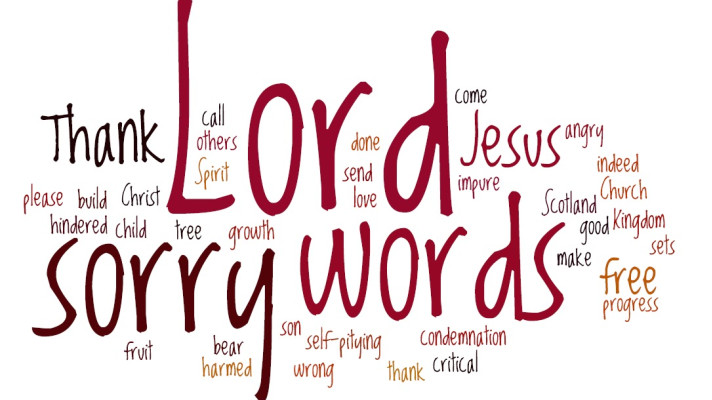
For we all stumble in many things. If anyone does not stumble in word, he is a perfect man, able also to bridle the whole body. (James 3:2, NKJV)
It was my turn to read the ten spelling words aloud to my sixth-grade class. Because I had a speech impediment, reading this word list brought embarrassment. The sneers of children pierced my heart as I mangled the pronunciations.
However, good news came when our small school managed to obtain a speech therapist during that year. She was most kind and sympathetic. She taught me to position my tongue correctly to make the proper sounds. My speech matured through her patient efforts, and I gained greater control of my words.
Likewise, as Christians, we are to gain control of our tongues. Words and how we deliver them have a powerful effect. They can provide healing, comfort, inspiration, encouragement, and empowerment. On the other hand, they can bring discouragement, pain, and destruction. Words are powerful! Due to our sinful nature, they can be weaponised for ill. If we are not careful, what we say can wreak havoc in our families, communities, and even churches. Words of anger, ones that promote gossip, and slanderous words are like a raging fire.
James alludes to how a small fire kindles a much greater one. A single match can set a plush forest ablaze. Therefore, we should not dismiss the nature of speech and its effects. God's word created the heavens and the earth. He spoke, and it came to be from nothing. Our words cannot create life as can God's. Yet, they are not without life. “Death and life are in the power of the tongue” (Prov. 18:21). It can bring harmony and peace, or it can wound and divide.
Our speech can also be duplicitous. We may come to church and praise God in worship. Afterwards, we can demean our children and verbally abuse our spouses. How can we bless God and at the same time injure those He created? The core problem is not the tongue; it's the heart. Our speech merely expresses what is in our hearts.
James compares the size of a ship to its rudder. The rudder is small, and yet it steers the sizeable vessel. Likewise, the tongue is relatively small, yet it can drive the course of one's whole life. However, it is not the rudder that directs the ship but the pilot who turns the rudder. "No man can tame the tongue" (James 3:8). Therefore, we need to pray that the Spirit will pilot it. We must cede control of our will to His divine nature and power. God will then teach us to guard and control the tongue. He will guide the rudder.
My speech therapist did more than teach me how to speak correctly. She freed my heart and eased my shame. As I came to trust her, I yielded myself to her expertise. Trust God! Yield your heart to Him. Pray that your words are a fountain of life. Allow the Lord to tame your tongue!
Upwards In One Accord
Pastor Michael Blog 24 Apr 2022 Michael Falzarano
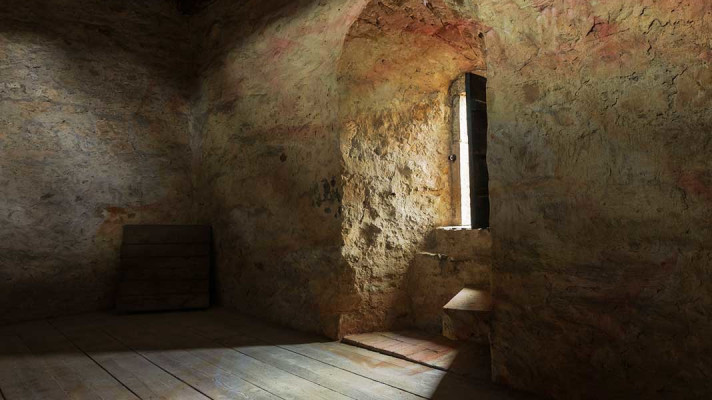
When the Day of Pentecost had fully come, they were all with one accord in one place. (Acts 2:1, NKJV)
Children like to go upwards. You see them tackling steep hills and scurrying up trees. The sense of height is thrilling for one so small. Riding in an aeroplane is exhilarating for most children or rising to the top of a Ferris wheel. Even lower elevations are alluring, such as barn lofts or house attics. There is something about going higher that motivates children. So, it is with God's children.
Jesus' disciples were motivated to go higher as they went to the upper room. One could claim this was not much of an ascent, just an upper floor. However, they were ascending to an extraordinary height in the spiritual sense. After His resurrection, Jesus had been with His disciples for forty days, teaching and preparing them for what was to come. He instructed them to gather together in Jerusalem as they waited for the promise of the Spirit. As God's children, they did so with joyful anticipation!
After leaving that upper room, God did mighty works through the disciples. But what happened in that room? There were 120 in attendance, a mixed group of women and men with different backgrounds and professions. Yet they shared a common identity and faith. They served a living Saviour who had ascended to the courts of Heaven. Due to this, they came together in one accord, in one place. Don't miss this point; it is vital!
After the cross, Jesus' disciples were scattered and in fear. Even before His death, the apostles were at odds, striving for lofty positions in Jesus' coming kingdom. But after His resurrection, the disciples' hearts were filled with boldness as their fear and pride fled. They put away their differences and their fight for supremacy. In the upper room, they reached new heights by humbling themselves before God. The disciples searched their souls and confessed their need and unbelief.
Instead of focusing on each other, their eyes turned heavenward to Christ and the mission set before them. God would supply the power; they needed to provide willing hearts. Their pursuit became furthering His kingdom. In so doing, the disciples of Jesus were preparing to ascend to lofty heights. The upper room experience would further sanctify the inner room of their hearts.
The upper room was ordinary! What transformed it into something extraordinary was prayer, unified and focused prayer. It is crucial to note that receiving the outpouring of the Holy Spirit at Pentecost did not bring the disciples into unity. Instead, they became unified to receive the Spirit's abundance. Then they were able to go forth under the Spirit's power to unfurl the gospel.
Jesus is soon to return. Is He not calling us to that upper room experience beforehand? It means we are to humble ourselves, search our hearts, and put away our differences. Connect with other believers in purposeful, mission-oriented prayer. In childlike faith, go with them to that upper room. Go in one accord.
The Story In Clouds
Pastor Michael Blog 02 Apr 2022 Michael Falzarano

Then the sign of the Son of Man will appear in heaven, and then all the tribes of the earth will mourn, and they will see the Son of Man coming on the clouds of heaven with power and great glory (Matthew 24:30, NKJV).
I enjoyed laying down upon a grassy incline and gazing up into the cloud-laden sky as a young boy. I would watch the clouds sail by me in the domed blue sea of air, knowing they had a story to tell. The most intriguing thing was how they transformed before my eyes. A cloud would become a floppy hat atop a bear. A small cloud shaped like a flower became something I could readily pick. Another, a long-shaped cloud, was changed into a scary dragon. In another, a mushroom cloud seemed to become a nuclear explosion. I would stare at the clouds and see angels, animals, trees, faces, shapes of countries, and a host of other familiar things. They told quite a story.
The clouds in the Bible tell a far more astounding story. The clouds are associated with divinity and divine events. Behind them is the work of God, what He has done for us and will do. They reveal that He is the all-powerful creator and redeemer. Clouds do His bidding; they are "His chariot" and the "dust of His feet." (Psalm 104:3; Nahum 1:3).
God set the rainbow in the clouds after the flood, declaring His faithfulness. In the pillar of cloud, He guided Israel in their desert wanderings, protecting them from the scorching heat. It showed God's leading and provision. Then, in a thick cloud covering Mount Sinai, Moses came near God to receive the Ten Commandments. Sin is the transgression of the law. But if you seek His forgiveness, He will sweep away your sins "like a cloud." (Genesis 9:13; Exodus 13:21-22; Isaiah 44:22).
At Jesus' transfiguration, it was through a cloud that the Father declared, "This is My beloved Son. Hear Him!" We do well to listen! Then there was that extremely dark cloud over the cross when it covered Jesus and the land. Due to Jesus bearing our sin and guilt, He felt utterly abandoned. Where was His Heavenly Father during this horrendous time? Was He not concealed in the darkness and "thick clouds of the skies"? He was suffering along with His Son. It is in the dark clouds that God is all the nearer. (Mark 9:7; Psalm 18:10-11).
The powerful news is that the Messiah died for our sins and rose from the tomb, triumphal over sin and death. The clouds address this, for many witnesses beheld Jesus ascend to heaven in "a cloud." Not only that, but Christ will soon return "on the clouds." Those who trust Him for their salvation and deliverance will be caught up "in the clouds to meet the Lord in the air" and forever be with Him. (Acts 1:9; Matt. 26:64; 1 Thess. 4:17).
Therefore, be encouraged by the clouds; they tell an astonishing story. They speak of God's creative and redemptive works. Remember that when you behold them in the sky.
DO NOT LOSE HEART
Pastor Michael Blog 14 Mar 2022 Michael Falzarano
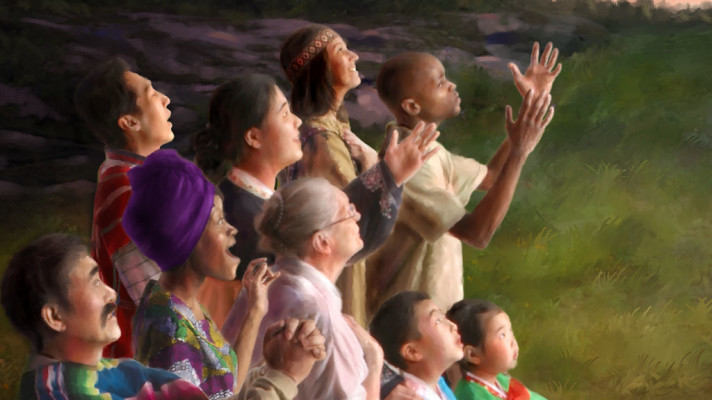
So we do not lose heart. Though our outer self is wasting away, our inner self is being renewed day by day. (2 Corinthians 4:16, ESV)
My car is over two decades old, having travelled over 323,000 kilometres. Its fading paint, multiple dents, bangs, cracks, and crumpled metal showcase its years of abuse. Someone stole it and used it in a robbery. I noted light damage to it upon its retrieval. My vehicle later ended up in a low-speed accident in front of a church hosting a wedding at the time. Several well-dressed people rushed to assist. The car ended up with large dents to its left side. Years later, I was driving into the city when a vehicle suddenly crossed three lanes of traffic at high speed, sideswiping my automobile. Miraculously, the car only seemed to glance mine. The damage was the loss of an outside mirror and more dents, now to the right side. The automobile that hit mine kept on driving as several police vehicles, and a police helicopter chased it. No doubt, it was a stolen vehicle.
My automobile has a colourful history! Its beaten body speaks to the pounding it has taken over the years. However, it is still operating, proving to be a reliable and inexpensive mode of transportation. The body has sustained much damage, but the car's internal workings are going strong.
The apostle Paul could surely relate to this. He states that his "outer man" was wasting away. What did Paul's body suffer? It suffered beatings with both whips and rods. He was battered by storms at sea, having endured shipwrecks at least four times. Men viciously beat Paul, and a poisonous viper bit him. Paul suffered from the harsh environment of prisons. His body knew what it was to be stoned and left for dead. Paul experienced torture and persecution. Great indignities and injustices were his brutal companions. Years of such mistreatment and deprivation took their toll on his physical being. His body was a worn-out billboard that advertised his adversities through injuries and scars. Yet, none of that discouraged him; he never lost heart! The zealous flame of Christ only kindled brighter. As a well-travelled missionary, Paul propagated the gospel's good news of salvation. The love of Christ propelled him to do so. Though outwardly battered, inwardly, he became ever more renewed.
Paul considered all his affliction to be relatively light. Why? Because there is something far more significant to come, the resurrection. When Jesus returns, the dead in Christ will rise, so "what is mortal may be swallowed up by life" (1 Cor. 5:4). Yet even these present afflictions are not wasted. God uses them to grow us spiritually, preparing us for what is to come. What we see now is transitory. What God has prepared for us will be never-ending.
Don't lose faith, as faith connects us to the eternal things of God. As our old self degrades day by day, the new self in Christ is becoming more and more complete. Therefore, do not lose heart.
Image used by permission of SermonView
The Things God Has Prepared for You
Pastor Michael Blog 26 Feb 2022 Michael Falzarano
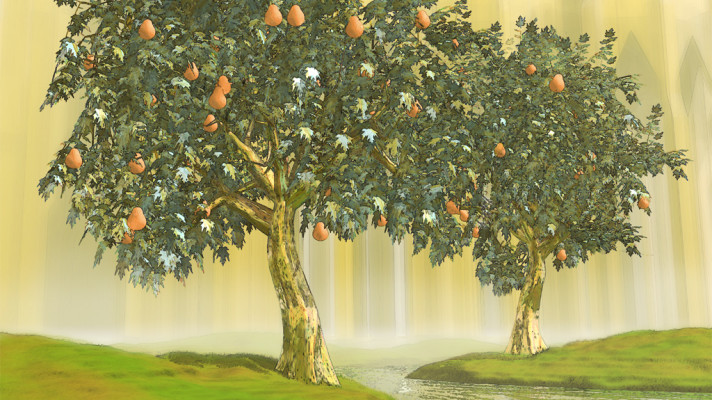
But as it is written: "Eye has not seen, nor ear heard, Nor have entered into the heart of man The things which God has prepared for those who love Him." (1 Corinthians 2:9, NKJV)
What tremendous things God has in store for those who love Him. The last two chapters of Revelation (Revelation 21 and 22) tell us much about this. His promise to us is "a new heaven and a new earth." When we survey what is in it, we should be greatly encouraged.
First and foremost, God will dwell with us. We shall be so close to Him that we "shall see His face." The New Jerusalem shall be part of it, reflecting His marvelous glory. But much more, "The throne of God and the Lamb shall be in it" and from the throne shall flow a life-giving river. We discover that the tree of life will be on either side of it, continually yielding its fruit, bringing healing to the nations. All this portends a perfect world, where each believer will forever bask in God's light and brilliance.
Let us dwell on this. Let us internalize the incredible things God has prepared for us. But not only that. We should also meditate on what will NOT be in the new earth. There will be no sin. There will be no selfishness, pride, hatred, bigotry, or any other like cars in its train. None of this will exist. These things will be forever gone: Immorality, unfaithfulness, falsehood, killing, abuse, slander, hostility, war, and such. The harmful effects of sin will be no more. There will be no more tears, sorrow, pain, sickness, or death. Neither will Satan be anymore, the one who unleashed these evils into this world.
There will be nothing that defiles, nothing impure or corrupt. Sin brought the curse into this world when Adam and Eve rebelled against God in the garden. It brought thistles and thorns, agony, and destruction in its path. Christ took the curse upon himself, so we would not have to bear it. In the new earth, no remnant of it will exist. You will know no guilt, and no burden will you ever have to carry.
There also will be no temple in it. Why? Because "The Lord God Almighty and the Lamb are its temple." God will dwell fully with us and we with Him. No barriers, no obstacles, no hindrances, or separation will exist. God's unselfish love will permeate every molecule of our being. There will be no lack. God will see to it.
Therefore, long for the future things God has prepared for you. But in doing so, fail not to grasp what He has prepared for you today. God's presence and love are available to you now. The Holy Spirit can infill you now. You can receive the victorious life of Christ now. Be joyful for what will come in the morrow. However, do not neglect the blessings God has prepared for you today.
Image used by permission of SermonView
Consider It All Joy
Pastor Michael Blog 31 Jan 2022 Michael Falzarano

Consider it all joy, my brethren, when you encounter various trials, knowing that the testing of your faith produces endurance. (James 1:2–3, NASB)
Should we be filled with joy when suffering through trying events? Job lost his children, wealth, and health in a short period of time. How could one be joyful through such an adverse ordeal? James isn’t saying to feel joyful, but rather to “consider it all joy”. Why? Notice that the testing of our faith “produces endurance”.
It appears James’ inspired prescription to remedy impatience is trials. Trials are tutors that teach us our need and through our need we learn to depend upon God. Through dependency we learn to wait upon Him. Endurance becomes the pathway towards spiritual maturity. The context tells us that such maturity brings us to the point of “lacking nothing”. Paul, who encountered great adversity, declared, “I have learned in whatever state I am, to be content” (Phil. 4:11). Contentment is a marvelous place to reside. We enter its abode when self is stripped and our full weight is placed upon God. It’s when we know, beyond a doubt, that we are in His will and no adverse wind can dislodge us from it.
Unfortunately, we tend to fixate on the troubles themselves. Doing so brings much worry. But as our faith matures, our eyes fix more and more upon Christ, not on the trials. We come to realize that Christ is with us in the calm and in the raging storms. Although Job struggled to understand the adversities that befell him, he trusted God throughout them. His faith endured. Through his ordeal, he came to know the power and care of God. The fiery trials purged his mind and heart of their dross, as he clung to his all-sufficient Savior. Job could consider his afflictions as all joy.
What if I can’t count the various trials hitting me as all joy? “If any of you lacks wisdom, let him ask of God.” Seek divine wisdom, and it will be given to you. In fact, it will be given to you “liberally and without reproach.” Our Lord will not rebuke you for asking. Rather, He will lavish you with wisdom to endure the trials. This, so you can count it all joy.
But we must “ask in faith, with no doubting”. Doubt moves us backwards; faith moves us forward. We can’t reach Christian maturity if we go back and forth between the two. This is having two minds, each opposing the other. The result of which is likened to a wave of the sea being tossed about by a strong wind. In doubt we flounder and become unstable. However, if our faith is fixed on our all-sufficient saviour, then our sails of endurance will be lifted high. We will make it to port, lacking nothing.
Do you find yourself in a troubled sea? Have faith and consider your trials as all joy. Know that God is sailing you closer and closer to his harbour.
God Manifested
Pastor Michael Blog 24 Jan 2022 Michael Falzarano

We proclaim to you what we ourselves have actually seen and heard so that you may have fellowship with us. And our fellowship is with the Father and with his Son, Jesus Christ. (1 John 1:3).
We cannot directly experience God through our senses. Why? He is Spirit and we bear a fallen human nature. So, in the natural order of things, we cannot see, touch, or hear Him. It’s true we can experience God through nature, prayer and His word. Yet, we lack a direct sensorial connection to Him. But John says the apostles had such tangible contact. How?
Scripture tells us that all things were created through Christ. He was there in “the beginning,” and “the word was with God and was God”. We also learn that He, the “word of life,” was manifested in human flesh (John 1:1-3, 14; 1 John 1:1-2). Therefore, the apostles were able to see and behold God, to hear and touch him, in Christ. They spent much time with Jesus. They travelled, ate, conversed and ministered with Him. They witnessed His power and love, up close, in intimate terms. This the apostles declared, that others might believe and by believing have eternal life.
However, there was a gnostic element that denied God took human form, saying Jesus had a phantom body, not a real one. John denounces this soundly. He saw, beheld and touched the flesh of Christ. Jesus was beaten and bled, He was crucified and died. A spirit cannot do that. He came in the flesh, but He was much more than human. He was Immanuel, “God with us”. God in the flesh! The apostles declared this, and by it the gospel of salvation.
But what of those who came after the apostles. How could they see, hear and touch God? We don’t have the same opportunity the apostles had. After His death, Jesus rose and ascended to heaven. So, how can any see and touch Him, as did they? Is not the church Christ’s body on earth? Does God not indwell His people through the Holy Spirit? Certainty! Then this is where such sensorial fellowship with God can be had.
The church is to be the hands and feet of Jesus on this earth. It is to embrace others in His arms of love. It is to speak His words through caring lips. It is to hear the plight of others with His patient and attentive ears. It is to see others through His compassionate and impartial eyes. This is to say, the church is not to only declare Jesus with words, but with godly actions and a loving attitude. His people are to actually manifest Christ to others.
But how can others have fellowship with God through us, if we fail to gather together in meaningful fellowship? This is why true Christian fellowship is so imperative. Because through it, others can obtain a tangible contact with God. Therefore, don’t forsake communing with like-minded Christians. As you do so, be mindful of who you are manifesting.
Image used by permission of SermonView
A New Beginning
Pastor Michael Blog 08 Jan 2022 Michael Falzarano

Forget what happened in the past, and do not dwell on events from long ago. I am going to do something new. It is already happening. Don’t you recognize it?... (Isaiah 43:18-19, GW)
God is a God of beginnings. We find this in the first verse of the Bible. The Earth was chaotic, dark, without form or life. God spoke! His light separated the darkness. The Earth was filled with life, and order replaced the chaos.
Adam and Eve’s role was to trust their creator. Then they could seize the new opportunities created for them. Unfortunately, they ended up doubting God and rebelling. This brought separation, conflict, pain, and death in its wake. The creation deteriorated; sin blighted its once pristine perfection. Therefore, a new beginning was needed. God promised the couple that a savior would come, who would deliver them from sin and its condemnation. This gave them that new beginning.
Later darkness and chaos again blanketed the Earth. The antediluvians fixed their hearts continually on evil. To cleanse the world, God sent the flood. It swept away the blight of misery and degradation. He established a new order through Noah and His family, who were delivered through their faith. They also were given a new beginning.
God’s people ended up in slavery and spiritual darkness in Egypt. But they cried out and the Lord miraculously delivered them, giving them a new start. They were taken to a new land, a land of promise. God’s presence was with them, symbolized by the glorious temple that was built in Jerusalem. But in time the people lost faith in God. This brought the mighty armies of Babylon to descend upon them, decimating the temple and Jerusalem. Out of despair, they cried unto God and He heard them. He would do “something new” for them. The temple would be rebuilt, as would the nation. In that temple, the Messiah would come. And He did! He came and died for the sin of the world. With that, mankind had a new beginning. We receive it when we put our faith in Christ.
We see therefore that God is a God of beginnings. Though trials come, though darkness and chaos will reign on Earth for a spell, we can have a full assurance that a new beginning will soon come. Christ will return for His people. There will be a new heaven and a new earth created, in which only righteousness will dwell. This new beginning will never end.
This is marvelous news! But what if you have veered from God and feel empty. What if you find yourself in darkness now? What if chaos is overwhelming your heart today? Remember, God is a God of beginnings. He brings light where there is darkness. He brings order where there is chaos. He brings abundance where there is emptiness. Look to Christ and He will do “something new” in your life. Why? Because this is who He is. This is what He loves to do.
Image used by permission of SermonView
A Matter of Death and Life
Pastor Michael Blog 19 Dec 2021 Michael Falzarano

“Even so consider yourselves to be dead to sin, but alive to God in Christ Jesus.” (Romans 6:11).
It is illegal to bury someone alive, and rightly so. But what about in the Christian faith? Baptism represents death to the sinful life and the taking on of a new life in God. Yet some are buried in the waters of baptism while their old self is still fully alive. Therefore, they are buried alive. This should not be!
On this point, the apostle Paul asks, “Shall we continue in sin that grace may abound?” His answer is empathic, “Certainly not!” Why? “How shall we who died to sin live any longer in it?” (Romans 6:1,2). Paul understood that Christian victory means death to sin. He uses baptism to illustrate this.
When one goes under the water, they are identifying with the death of Christ. And His death was “to sin” (verse 10). So, ours is to be. Will the alcoholic who died from cirrhosis of the liver, take another drink of alcohol? Of course not, he is dead. Dead to its power and lure! And with death comes burial. Jesus was put into the tomb after his crucifixion. Indeed, we were “buried with him through baptism into death” (verse 4). The Greek word used for buried means to be co-interred with someone. The old self is dead and buried with Christ. As wonderful as this is, it is nonetheless insufficient. For death without resurrection means no power. If Jesus had not risen from the grave, then there would be no salvation, nor any victory.
But Jesus did rise! And by faith, we should consider ourselves risen with Him. “If anyone is in Christ, he is a new creation, old things are passed away, all things have become new” (2 Corinthians 5:17). The old self needs to be left behind as we take on the life of Christ. This is achieved through the power of the Holy Spirit. We need not live any longer in bondage to sin. No longer is it our master. Why? Because, “It is no longer I who live, but Christ lives in me” (Galatians 2:20). If we died with Christ, we CERTAINTY will be raised with Him. It naturally follows! This is the Christian life. This is the marvel of the gospel.
Why then should we ever go to the cemetery and dig up the old self that’s buried there, with all its guilt and sin? What a horrible and faithless thing to do! Of course, even without our assistance the old man or woman tries to return from the dust. What to do! Remind him or her of their death. By faith, bid them farewell. How? By going to the cross daily and “consider yourselves to be dead to sin, but alive to God in Christ Jesus.” Grasp this truth in faith! It is a matter of death and life. It is the key to Christian victory.
Image used by permission of SermonView
The Prophetic Word
Pastor Michael Blog 26 Oct 2021 Michael Falzarano
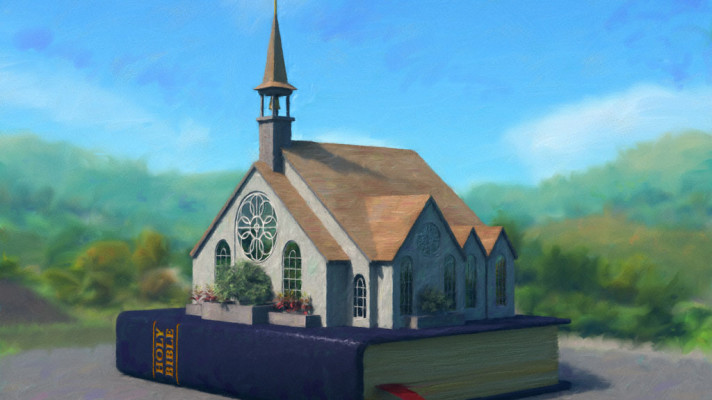
For we did not follow cleverly devised tales when we made known to you the power and coming of our Lord Jesus Christ, but we were eyewitnesses of His majesty. (2 Peter 1:16, NASB)
A house must be built upon a firm and reliable foundation. As Christians, our foundation must be the certainty of God’s word. The apostle Peter amplifies this as he addresses the sure word of prophecy. How sure is the prophetic word? Why it is the most certain thing in the whole universe, for it comes from God.
Peter illustrates why this is so. He had the prophetic word of the Old Testament. It spoke of the certainty of the coming Messiah. He believed it! Then it happened! The apostles saw the Messiah in the flesh, they touched him, lived with him, beheld his miracles, and heard his life-changing words. Peter writes that he, along with John and James, were eyewitnesses to Christ’s majesty. Jesus was transfigured before their sight, in tremendous glory. The Father spoke thunderously from the heavens affirming his Son. What did they see? Yes, Christ glorified before them. But they saw the future as well.
Peter lived through the first coming of Christ. He beheld his ministry on earth; his death, resurrection, and ascension. On the Mount of Transfiguration, the living, prophetic word was flashed before him in a dazzling display. In this, he was given a glimpse of the Lord’s Second Coming when Jesus will return in divine majesty and splendour. The prophetic word of the First Coming of Christ was confirmed as it unfolded before him and the others, in real-time. Therefore, the Second Coming is rock solid, it is certain, as certain as was the First Coming. It will happen, there should be no doubt!
The apostles were eyewitnesses to this prophetic fulfilment. But we must take care to not rely on only what we see. For what we see may not align with the prophetic word. The apostles did not go merely by what they saw. Their lives were built on God’s word. But what they saw, confirmed what the word had foretold.
Peter, in light of his impending death, warns the saints to veer not from biblical truth. False teachers would come, with deceptive words working to knock them off their established foundation. Their teachings are derived from human invention or reasoning, not from divine utterances. But God’s word was written by holy men who were moved by the Holy Spirit (2 Peter 1:21). It is from the Spirit; therefore, it is absolute truth, certain, and fully trustworthy.
As prophecy has been fulfilled already, this guarantees that what has yet to be fulfilled will be fulfilled. It will happen! How do we know? “We have the prophetic word made more sure” (2 Peter 1:19). Do not build your spiritual house on anything else. For anything other will crumble, “But the word of the Lord endures forever” (1 Peter 1:25). Believe it! Trust it! Rely on it! And like Peter, you will behold the Lord’s glory.
Image used by permission of SermonView
The White Horse
Pastor Michael Blog 07 Oct 2021 Michael Falzarano

And I looked, and behold, a white horse. He who sat on it had a bow; and a crown was given to him, and he went out conquering and to conquer. (Revelation 6:2).
According to Revelation, there is a white horse that goes forth conquering. Three more horses follow it, bringing distress in their wake. A red horse robs peace from the earth. Next, a black one brings famine. Finally, a pale and ghastly one brings pestilence and death.
When Israel put their faith in God, the covenant blessings flowed their way. On the other hand, when they pushed God and his protection away, then the covenant curses would befall them. Such curses were expressed with the idiom of sword, famine, pestilence, and wild beasts (Ezekiel 14:21, cf. Revelation 6:8). However, the purpose of allowing these conflicts and trials was not punitive but redemptive in nature. They were God’s agents to turn wayward Israel back to himself and his everlasting covenant. What about the white horse?
The white horse is emblematic of victory. Jesus is seen riding a white horse at his triumphal return, the Second Coming (Revelation 19:11-12). As he will return as the King of Kings, he is pictured as wearing royal crowns (diadēma). But before that, in Revelation 6:1, he wears the victory crown (stephanos). This crown, as the color white, is associated with Christ and his people in the book of Revelation. Therefore, this first horse points to Jesus and the gospel that he brings to the world. When we embrace him and it by faith, we receive the covenant blessings.
What of the bow? It symbolises warfare. Warfare is most often fought to conquer and gain territory. What territory does the white horseman conquer? The ground of human hearts. When the gospel is embraced, conversion happens, and the sinful heart is captured. We become new creations in Christ. But if we later turn our backs on him and the gospel, then the covenant curses follow. But Jesus follows us as well! He strives to win us back.
The sword may come to take our spiritual peace. Famine may come to create a spiritual hunger for God’s word. If we turn back to him, then peace and satisfaction will return. But what if we persistently resist and return not? The pallor of pestilence and spiritual sickness may gallop in. Yet it is none too late to turn back to Christ and be healed. He allows us to leave, for he respects our free will. As well, he allows these arrows of distress to pierce our hearts. Why? His labours are to restore.
It is far best to never leave Christ and the gospel! Yet, perhaps you have already done so. Consequences may even now be heavily bearing down upon you as a result. If the red, black, or even the pale horse is near you, remember that the white horse is ever nearer. Jesus will ride to the ends of the earth to save you. Why? Because he loves you that much.
Image used by permission of SermonView